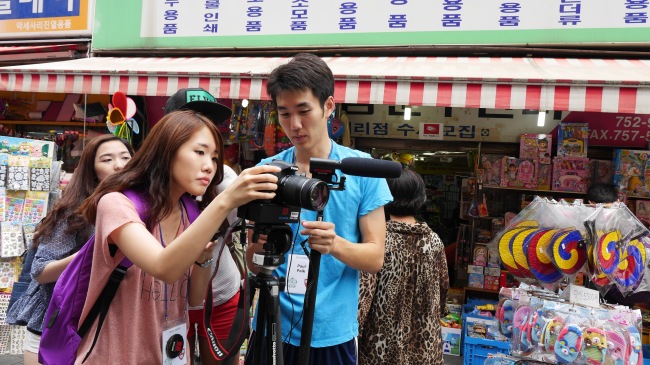Harvard, Ewha students show snippets of Korea in documentaries
By Korea HeraldPublished : Aug. 5, 2014 - 20:43
Six short weeks after the 2014 cohort of the Ewha-Harvard Summer School program set foot on the campus of Ewha Womans University, the students wrapped up documenting snippets of Korean society on camera.
Hours of hard work culminated in a documentary film festival Friday, where the students’ documentaries highlighting their perspectives on key issues in modern Korea were screened and applauded.
The summer course, titled “Cinema Korea: Documenting Korean Society through Film,” did not only help students develop the technical skills necessary to produce a documentary, said filmmaker and University of Michigan professor David Chung, who co-taught the course with professor Paul Chang of Harvard University.
Rather, through filming, students were able to gain confidence in interacting with film subjects and develop a deeper understanding of the Korean populace and lifestyle.
Hours of hard work culminated in a documentary film festival Friday, where the students’ documentaries highlighting their perspectives on key issues in modern Korea were screened and applauded.
The summer course, titled “Cinema Korea: Documenting Korean Society through Film,” did not only help students develop the technical skills necessary to produce a documentary, said filmmaker and University of Michigan professor David Chung, who co-taught the course with professor Paul Chang of Harvard University.
Rather, through filming, students were able to gain confidence in interacting with film subjects and develop a deeper understanding of the Korean populace and lifestyle.

“At first (the students were) like ‘Oh, we can’t go talk to that person’ and I said, ‘Yes you can. You can go talk to them,’” Chung said.
“Especially in Korean society, it seems like it’s hard but people here actually really open up. They want to talk to people and they will be happy to talk about different ideas.
“They have to meet people, they have to talk to them, they take language classes, so they really get involved and they learn about Korean culture.”
In the six featured documentaries, the subjects ranged from current events, such as the Sewol disaster, to rice and its role in Korean society.
Though Chang delivered substantive lectures on Korean topics that may have served as inspiration for the documentaries, he says the students were primarily responsible for choosing and bringing the topics to life.
“I think when I started teaching this course, I was at the same level as the students in terms of ability to hold a camera … which is basically nothing,” Chang said.
“But when I saw them go from the first day to watching the films today, I am so proud and I am so incredibly impressed at what they were able to learn ― not just the content, not just the technical aspects, but the sense of style in their filmmaking.”
For many students, the process of filmmaking may have been completely new, but the experience was collaborative with the incorporation of both Korean and American perspectives. Harvard University undergraduate Ivan Cisneros said that by having each side draw from their strengths ― in particular, having Korean students provide translations and American students help shape the narrative with a foreign perspective ― his team was able to form close bonds and learn from each other.
“The experience of making the film was amazing,” Cisneros enthused.
“Going to all these places, getting to know all these people, getting to know the Koreans on our team, becoming closer to them … in that respect, I feel like the experience of making the film was what most emotionally impacted me in a positive way.”
Ewha University student Yoon Seo-jeong initially applied to the Ewha-Harvard Summer Program to meet new people. Although surprised to discover soon after that the program involved taking a class on film, a subject she was not familiar with, she says she enjoyed putting the project together and learned a lot from it.
“Editing was quite a lot of fun … more fun than filmmaking,” Yoon said, despite her team having to pull three consecutive all-nighters to complete the documentary.
Yoon also was able to make new connections, just as she had hoped. However, for her, one problem remains: staying connected.
“I am the only one who is not on Facebook, so people keep asking me to make a new account,” Yoon said, laughing. “So maybe I will try doing that.”
Films in the Student Documentary Film Festival
• “Hanji Ceiling” ― A film that discusses the reality of the role of women in modern Korean society and the choices they are forced to make as a result. By: Kim Sol, Rhee Eun-ji, Kathryn Klingle, Kim Ha-young.
• “Miracle on the Han River” ― A film that explores the significance and identity of the Han River for Koreans and foreigners. By: Virginie Chan, Heo Won-min, Kim Ji-yoo, Hwang Jee-won.
• “inGrained” ― A film that comments on the social and cultural significance of rice and what some perceive to be its decline in Korean society as younger generations turn to other sources of sustenance. By: Arthur Ngyuyen, Bora Nam, Bora Ju, Yoon Seo-jeong.
• “Still, Sewol” ― A film examining the impact of the Sewol ferry disaster on aspects of Korean society from politics to personal grief. By: Elizabeth Yates, Kang Min-seo, Yang Su-bin.
• “The First and Last Generation” ― A film that highlights the struggles of Korea’s elderly. By Park Ji-yoon, Kim Young-eun, Sylvia Deppen, Paul Paik.
• “Falling Through the Cracks” ― A film which underscores the rapid economic development in Korea and how it comes with a price. By Kim-Mai Le, Bae Seong-eun, Ivan Cisneros, Yurina Lee.
By Dina Perez (dperez@heraldcorp.com)
-
Articles by Korea Herald










![[Hello India] Hyundai Motor vows to boost 'clean mobility' in India](http://res.heraldm.com/phpwas/restmb_idxmake.php?idx=644&simg=/content/image/2024/04/25/20240425050672_0.jpg&u=)









